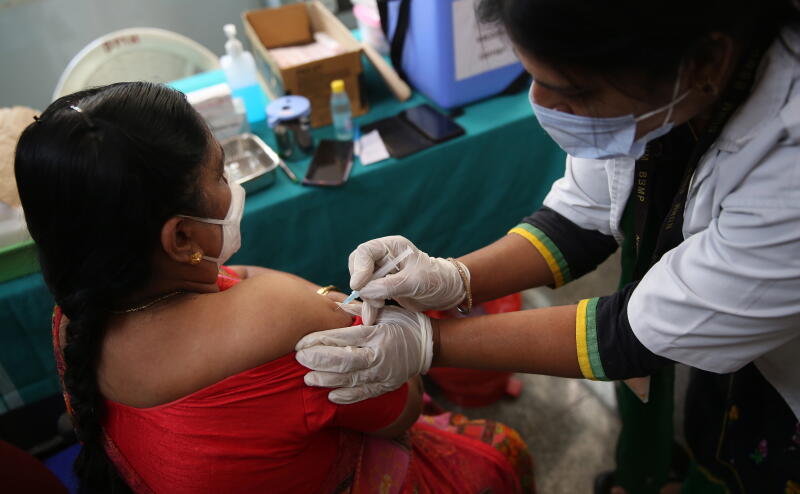India brings in private sector to speed up Covid-19 vaccination drive
Sign up now: Get insights on Asia's fast-moving developments

Some 20,000 private and 10,000 public hospitals will be administering the vaccine from March 1, 2021.
PHOTO: EPA-EFE
NEW DELHI - India's vaccination drive is expected to speed up substantially after the federal government roped in the private sector.
It will provide a boost for one of the world's largest immunisation programmes, which has got off to a very slow start.
Some 20,000 private and 10,000 public hospitals will be administering the vaccine from March 1, according to the government. Previously the drive involved only 10,000 hospitals, mostly public.
Unlike scores of other countries, India does not have a problem with access to vaccines. Instead, its issue is that the roll-out has been too slow.
More than 13 million healthcare and front-line workers have been inoculated in a month with vaccine hesitancy and a glitchy app slowing the process. India is using the app to contact beneficiaries and track the vaccines.
At the current pace, it would take more than three years to vaccinate the population.
Against the backdrop of these concerns, the federal government has now approved large-scale private participation even as the country expands the vaccination drive beyond an estimated 30 million frontline and healthcare workers.
In financial capital Mumbai the state government, fearful of an increase in cases, this week authorised 22 private hospitals to start vaccinating their own healthcare workers, taking some pressure off the overstrained public health infrastructure.
"We will go ahead on a larger scale from March 1," said Dr Gautam Bhansali, a consultant physician at Bombay Hospital and chief Covid-19 coordinator for all private hospitals in the city.
"For the last 10 to 15 days, the number of cases has increased in Mumbai. We can't say whether it is a second wave. The only solution is a surgical strike through vaccinations. There should be mass vaccinations."
India will also allow those who are eligible to buy vaccines at a private hospital. Government hospitals have been offering free jabs.
-
India's vaccination plan
The target is reportedly to vaccinate 300 million people by August.
As at Feb 26, India had vaccinated more than 13 million healthcare and frontline workers.
March 1: Estimated 270 million people - or 20 per cent of India's 1.35 billion population - targeted for vaccination. They are in two categories: those aged 45 to 59 and the over-60s.
Number of active cases: 155,986.
Total number of cases: More than 11 million.
The price of the vaccine, federal minister Prakash Javadekar said, is under discussion between "the health ministry, manufacturers, and the private hospitals".
India is the world's second-worst affected country by Covid-19, but has also seen the disease decline steady over five months. Still, that is being threatened by an increase in active cases in some states amid Covid fatigue within the populace.
India has approved two vaccines for emergency use, including Serum Institute of India's Covishield and Bharat Biotech's Covaxin.
The private sector had been pushing for a bigger role in the vaccination drive.
The Confederation of Indian Industry had urged the government to give permission to allow companies to vaccinate their employees and their families as well as rolling out vaccinations under corporate social responsibility programmes.
"Such a programme could benefit an additional 100 million workers in the formal sector and local communities by providing access to the vaccine," the confederation said in a statement.
Indian business tycoon and top philanthropist Azim Premji had suggested that 500 million people could be vaccinated within two months with deeper private sector involvement.
India has top-quality private healthcare available for those who can afford it, even as public healthcare has lagged behind.
India's poor and those in rural parts, however, depend on the public healthcare system, which led to the government doubling healthcare spending to 2.23 trillion rupees in this year's budget.
Experts said India is now in a position to speed up its vaccination programme to potentially immunise 300 million by August.
"India has been doing in range 300,000 to 400,000 vaccines for the last few days. This capacity with private participation can go up to two million per day as early as next week. This could result in 300 million people getting vaccinated by end-June," said Mr Arvind Singhal, chairman and managing director of management consulting firm Technopak Advisors.
"It seems there are no constraints as far as vaccines (production) are concerned. In case the government were to give approval to a third vaccine, it would further add to the capacity. It is now looking good."


